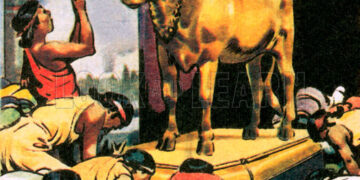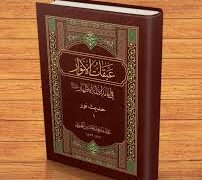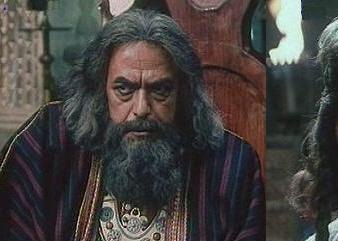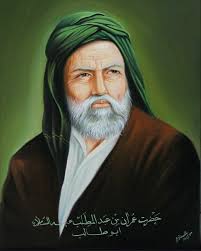Ibn Muljam or Muawiyah — which one is the killer of Ali (peace be upon him)? / When Muawiyah rides on the ignorance of the people
Muawiyah, riding on the ignorance of the people and with the lust for power and government, not only engaged in bloodshed and trampling the rights of Muslims to attain power, but also openly…
Al-Naba Al-Azim – A Forum for Shia Research
Author: Hamed Sarem
Lust for Power: The Valley of Destruction in Islamic History
The lust for power and rule is the greatest valley that drives people toward destruction and annihilation. Except for the Infallibles and those under their command, anyone who steps toward power and government inevitably enters this dangerous and destructive path.
Because the desire for power is so intense that it makes those who possess it blind, deaf, and mute. They see nothing, hear nothing, and say nothing except in pursuit of gaining power and maintaining government
In such a situation, anyone who appears as an opponent must be eliminated—even if that person is the brother or mother of the one in power. In this path, no religion or belief matters in reaching governance and power; only the caliphate and dominance are important.
The endless fire of the lust for power is so scorching and deadly that it consumes everything—even religion and humanity—because the lives of innocent and noble people have no value in front of this ruthless fire.
In Islamic history, this issue is clearly visible in the policies and actions of some rulers who would not give up power at any cost, even if it led to bloodshed and trampling the rights of Muslims
Muawiyah: Riding the ignorance of the people, the killer of the caliphate and the enemy of truth”
Those in power always use all their capabilities to portray themselves as the most righteous for rule and caliphate. The ignorance of the people has always been the best tool to achieve this goal.
Yes, Muawiyah, riding on the ignorance of the people and with the lust for power and rule, not only engaged in bloodshed and trampling the rights of Muslims, but he also openly waged war against God.
Nevertheless, many of those who consider themselves monotheists and beat the drum of religion today regard Muawiyah as one of the greats of the faith, and by emulating him, insist on the killing of Muslims and the shedding of their blood,unaware that Muawiyah is one of the most bloodthirsty and satanic oppressive rulers on this planet.
Muawiyah had no intellect; instead of intellect, he adopted abomination and devilishness. (1)
Muawiyah — the killer of Uthman
Muawiyah, who was a leftover of Saqifah and the product of the caliphate of the three previous rulers, did everything in his power to achieve the caliphate.
He was not even satisfied with the rule over Sham (Syria). The fire of his lust for power was so blazing that he even showed no mercy to his own party member, Uthman ibn Affan—who was from the Umayyadsand deliberately led him to death.
The Commander of the Faithful (peace be upon him) wrote in a letter to him: “By God, none but you killed your cousin.” (2)
Muawiyah neglected to help Uthman until he was killed. Al-Baladhuri writes in Ansab al-Ashraf: “Muawiyah did this so that Uthman would be killed, and he would call the people to himself.” (3)
Muawiyah killed Uthman to preserve and reach power. Uthman, who was an obstacle in his path to rule, was eliminated with this trick.
However, contrary to his desire expecting to take over the Muslims’ affairs after Uthman’s caliphate people pledged allegiance to the Commander of the Faithful Ali ibn Abi Talib (peace be upon him), and the apparent caliphate of Imam Ali (peace be upon him) began.
Is Muawiyah the killer of Imam Ali (peace be upon him)?
The allegiance to Imam Ali (peace be upon him) was against Muawiyah’s will. He, who dreamed of the caliphate by having Uthman killed,
This time, under the pretext of bloodlust, Uthman entered the political arena and launched two major wars through cunning and deceit.
Eventually, Imam Ali ibn Abi Talib was martyred in the niche of the mosque by “the most wretched of the latter one.”
It is widely known that Ibn Muljam, the killer of Imam Ali (peace be upon him), was one of the remaining Kharijites; and in retaliation for Nahrawan, and in line with the theory and slogan “The rule belongs only to God,” martyred Imam Ali (peace be upon him).
However, with a little contemplation, it seems that the main suspect and the one behind the scenes of Imam Ali’s (peace be upon him) martyrdom was Muawiyah and Amr ibn al-As. These two are the main Defendants in the martyrdom of Imam Ali (peace be upon him).
Attention to the following points is necessary:
- Muawiyah was definitely seeking the murder of Imam Ali (peace be upon him); because the fire of lust for power and the dream of caliphate drove him to kill Uthman, despite Uthman being of his own party.
2.Muawiyah always avoided direct war with Imam Ali (peace be upon him). In the Battle of Siffin, to avoid direct confrontation, he raised the Qur’ans on spears and proposed arbitration.
This becomes significant when we know that Imam Ali (peace be upon him) was martyred while preparing for war against Muawiyah. Therefore, Muawiyah’s only solution was to assassinate him.
- Secret assassinations were part of the Umayyads’ practice. This family was very skilled and experienced in conducting complex and hidden assassinations.
Muawiyah and the Umayyad party always relied on assassination as a political strategy. His famous quote after Malik al-Ashtar’s assassination was: “Indeed, God has armies made of honey.”
“Secret Assassinations: The Umayyads’ method of eliminating opponents and Muawiyah’s role in the killing of Imam Ali (peace be upon him)”
Muawiyah took only one path to achieve his goals and realize his dream of caliphate: the assassination of the Commander of the Faithful, Ali (peace be upon him). He had no other solution but to physically eliminate his opponents.
This approach was not limited to Imam Ali (peace be upon him) but was a widely seen practice in Umayyad political history.
The Umayyads, especially during Muawiyah’s era, heavily relied on assassination as a political tool and frequently eliminated their political opponents through secret conspiracies.
Among the individuals who were poisoned and killed were Ka’b ibn Abi Sufyan, Abd al-Rahman ibn Awf, Sa’d ibn Abi Waqqas, and Ziyad ibn Abih.
But the most prominent example of these hidden assassinations was the martyrdom of Malik al-Ashtar, who was martyred by poison at the hands of Muawiyah.
Imam Hasan al-Mujtaba (peace be upon him) also suffered from a similar conspiracy of poisoning and martyrdom.
This covert method of assassination was not only common in Muawiyah’s time but had been one of the Umayyads’ regular approaches in establishing and maintaining power since their early history.
In this context, examining the character of Ibn Muljam—the killer of Imam Ali (peace be upon him)especially in relation to Muawiyah, clearly shows that he may have acted as one of the operatives executing Muawiyah’s order in this historic crime.
This theory is strengthened by the political assassination background and the Umayyad approach to eliminating opponents.
“Ibn Muljam: Assassin or Secret Agent? Behavioral Contradictions and Hidden Connections”
Historical reports do not indicate that Ibn Muljam had a house in Kufa. Nor is there any record of a wife or children for him in Kufa—neither before nor after ibn moljam went to hell “Allusion to destruction”. He stayed at the house of Qutam or Ash’ath.
The Kharijites were famous for their intense worship and piety—devout and ascetic, yet without insight. However, no sign of asceticism or devotion is seen in Ibn Muljam. His behavior, as recorded in history, resembles more the Umayyads than the Kharijites.
On the Night of Qadr, Ibn Muljam drank wine with Qutam (4), and at the moment of attacking the Imam (peace be upon him), he was wearing a silk dress(5), and on a night during Ramadan, he committed adultery with Qutam. The Kharijites are well-known for their extreme asceticism.
They considered major sins forbidden and obligatory to execute the sinner if they did not repent.
How can someone believe that committing a major sin is equivalent to disbelief and leaving the faith, yet fearlessly drink wine and commit adultery in Ramadan, and wear silk—prohibited for men? Ibn Muljam, on the night he committed adultery with Qutam, gave her one hundred thousand silver dirhams (6).
This shows clearly that Ibn Muljam possessed great wealth and spent it all in a single night without any consideration.This is while, in the Battle of Jamal, Imam Ali (peace be upon him) distributed the treasury of Basra among Muslims, and each received five hundred silver dirhams
Ibn Muljam: From the Kharijites or an Umayyad agent? Analyzing material motives and hidden connections in the assassination of Imam Ali (peace be upon him)”
It is clear that Ibn Muljam’s motive in this great crime was not to attain the afterlife or paradise. He was entirely after worldly gains. One who seeks the hereafter and commits such a crime should have shown utmost asceticism and humility that night.
It is evident that Ibn Muljam was greedy for wealth in exchange for assassinating Imam Ali (peace be upon him). Therefore, it must be said that he was not from the Kharijites.
The words of the Commander of the Faithful are evidence for this; when the sword struck his blessed head, he said: “The son of the Jewish woman, Abd al-Rahman ibn Muljam al-Muradi, has killed me.” (7)
And in another narration, the Prophet (peace be upon him and his family) said to Imam Ali (peace be upon him): “Indeed, your killer is like a Jew, rather, he is a Jew.” (8)
Behind the scenes of the Umayyad conspiracy: Did Ibn Muljam carry out a Jewish mission?”
Two important questions lie ahead:
1.What was the connection between Ibn Muljam and the Umayyads with the Jews?
2.From whom did Ibn Muljam expect a reward, and how did he obtain such a large amount of wealth?
If the second question is answered, the first will also become clear. When we understand the deep ties between the Umayyads and the Jews before Islam,
during the Prophet’s time, and after his martyrdom and recall the cooperation of these two hostile groups in conspiracies and killings it becomes clear that Ibn Muljam was an agent of the Umayyads and the Jews.
The Messenger of God (peace be upon him and his family) used to invite people to recite the Qur’an, adhere to it, and leave aside the Torah and the Gospel, while ‘Umar (9) constantly sought to read the Torah because he knew Hebrew. The Prophet forbade him from reading the Torah.
Abu Hurayrah says: The People of the Book used to read the Torah in Hebrew and interpret it into Arabic for the Muslims, and the Prophet said: “Do not confirm the People of the Book, and do not deny them, but say: ‘We believe in God and what was revealed to us and what was revealed to you.’” (10)
Even though this narration is not from a reliable Shia source, the strong connection of the Jews with some Muslims is clear. Or when ‘Umar said he asked the Prophet about learning the Torah (11), or elsewhere said: “O Messenger of God, the People of the Book narrate hadiths that move our hearts,
and we were eager to write them.” It is very significant that the one who prohibited the writing of prophetic hadiths was eager to write Jewish narrations. Al-Suyuti writes that ‘Umar would go to the Jews and hear the Torah from them (12).
The study of the Umayyad relationship with the Jews deserves separate and thorough investigation, but this much is enough: the link with the Jews existed among the Umayyads and their allies from the time of the Prophet so much so that ‘Umar, in his final hours, consulted Ka’b al-Ahbar about his successor,
and Ka’b suggested Uthman or Muawiyah for caliphate after ‘Umar. (13)
The Conspiracy of the Jews and Banu Umayyah Against the Commander of the Faithful: A Hidden Truth”
The Jews and Banu Umayyah had a deep and longstanding grudge against the Commander of the Faithful, Ali (peace be upon him).
Ali (peace be upon him) was the very one whose divine bravery and strength crushed the arrogant leaders of Quraysh and Banu Umayyah, such as Abu Jahls and tareqs mercilessly in the battlefield.
At a time when the Prophet (peace be upon him and his family) was conquering the fortresses of the Jews one after another, it was the hand of the Commander of the Faithful that brought the Jewish leaders into disgrace and drove them towards destruction.
It is natural that with such a history, the collusion of these two groups to eliminate him would not be far-fetched.
However, amidst these developments, Ibn Muljam, a person from Egypt, had close ties with Amr ibn al-As. Amr ibn al-As, who held the power in Egypt at that time, even employed Ibn Muljam as a teacher for the children of Egypt. Thus, the theory strongly emerges that Ibn Muljam, who possibly was sent towards Kufa with a special mission from Amr ibn al-As and Mu’awiyah, not only had a special mission to assassinate Ali (peace be upon him), but also, at a time when Ali (peace be upon him) was preparing for war with Mu’awiyah, this mission was entrusted to him.
Ultimately, considering all the presented evidence and indications in this discussion, it can be said with certainty that Mu’awiyah, under the cover of his policies and through hidden hands, committed the greatest crime in Islamic history.
Attributing Ibn Muljam to the Khawarij was perhaps actually a cover for his direct connection with Banu Umayyah and Mu’awiyah’s objectives, for history has always shown that the Nasibis, under any pretext,to seize power would label any opponent as “Khariji” (outsider)
Final Words:
In examining the question of whether Ibn Muljam or Mu’awiyah is the killer of Ali (peace be upon him), it is clear that Mu’awiyah is recognized as the principal agent behind the assassination of Ali.
Although Ibn Muljam is known as the direct executor of the assassination of Imam Ali, historical and political evidence shows that Mu’awiyah, by using the covert and terrorist policies of Banu Umayyah, especially during his own caliphate, played the main role in orchestrating this crime.
History demonstrates that Banu Umayyah, to preserve their power, did not show any leniency toward their opponents and that physical elimination of opponents through complex conspiracies and secret assassinations was one of their common methods.
Furthermore, the close relationship that Ibn Muljam had with Amr ibn al-As and Mu’awiyah suggests that he might have been under a special mission for this action.
The historical background of the deep and intense enmity between Banu Umayyah and the Jews against Ali (peace be upon him), as well as Mu’awiyah’s actions in the killing of Uthman, seeking revenge for him, and bloody policies for attaining the caliphate,
show more strongly than before that Mu’awiyah is the main accused in this crime. The fact that Ibn Muljam, during the holy month of Ramadan — a time when religious devotion and humility were expected — committed major sins such as drinking wine and fornication,
is evidence that he not only was not among the Khawarij but was likely connected to the hidden hands of Banu Umayyah and their missions to eliminate Ali (peace be upon him).
Ultimately, it appears that Mu’awiyah, by exploiting ignorance and creating division among Muslims — especially through his secret networks — succeeded in achieving the caliphate at any cost, even through bloodshed and assassination To commit the greatest crime in the history of Islam,
and through figures like Ibn Muljam advanced his goals.
Footnotes:
**Taken from the book “Hail Qatul Muawiyah Aliyyah”, Najah Ta’i
1- Usul al-Kafi, vol. 1, h. 3
2- Al-Ghadir, vol. 9, p. 149
3- Sharh Ibn Abi al-Hadid, quoted from Al-Ghadir, vol. 9, p. 150
4- Al-Manaqib, Ibn Shahr-e-Ashhub, vol. 2, p. 195
5- Bihar, vol. 42, p. 229
6- At-Tazkirah, Sibt Ibn al-Jawzi, p. 185 and Al-Manaqib, Ibn Shahr-e-Ashhub, vol. 3, p. 95
7- Bihar al-Anwar, vol. 42, p. 283, chapter 127 – The nature of his testimony and his will
8- Bihar al-Anwar, vol. 42, p. 197, chapter 126 – Informing the Messenger of Allah (peace be upon him) about his testimony
9- Although Umar was not from the Umayyads, he was an ally of the Umayyads to the extent that he left Syria at the disposal of the Umayyads and chose Uthman as his successor Does
10- Bukhari, Vol. 5, p. 150
11- Kanz al-Ummal, Vol. 1, p. 370, Hadith 1626
12- As-Sabah al-Nuzul, by al-Suyuti, Vol. 1, p. 21
13- Sharh Nahj al-Balagha, Ibn Abi al-Hadid, Vol. 3, p. 115
















